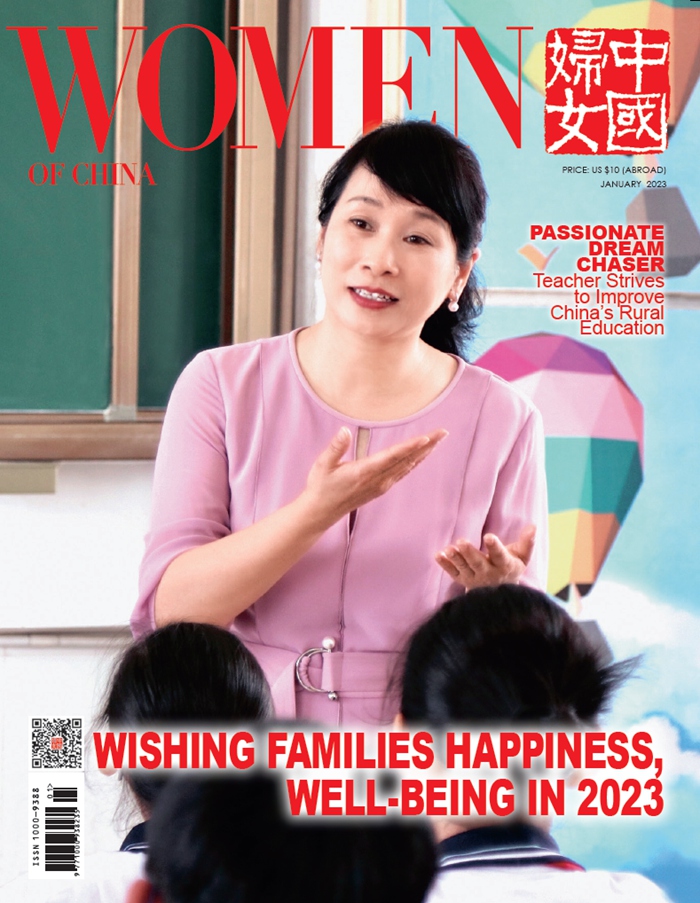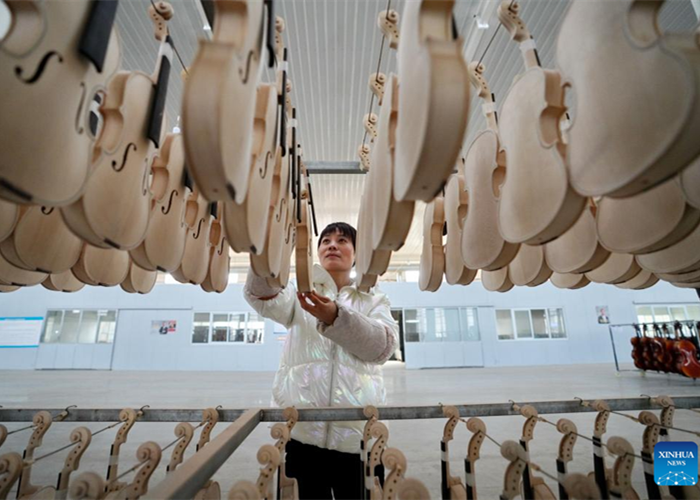Police and Families Give All to Control Disease
For many officers, the additional workload helped take their minds off personal concerns.
Having not seen her for more than 70 days because of the COVID-19 pandemic, police officer Bai Xuesong rushed to embrace his wife, Yu Kun, in the crowd when she stepped down from a coach that pulled up at a Beijing hospital on April 20.
In February, along with hundreds of other medics from the capital, Yu, a nurse in the anesthesiology department of Peking University First Hospital, went to Wuhan to help in the fight against the pandemic as the disease spread nationwide.
The period in Wuhan, capital of Hubei Province, was the longest the couple had been separated during their 10-year marriage.
To welcome his wife back, Bai, a stoic man, had bought a bouquet of flowers and prepared something sweet to say, but when he saw Yu at the hospital gate that noon, he lost his voice and could do nothing but hug her.
"I had thought of so many things to say, but once she was standing in front of me, I totally forgot everything," said the 38-year-old officer from Beijing's Shijingshan District.
"Medical workers, including my wife, suffered a lot in the battle against the pandemic. So her safe return was quite enough for me."
On February 7, Yu flew to Wuhan, one of the places hardest hit by the virus.
"I would be lying if I said I wasn't worried about her, because so many things were unknown at the beginning of the outbreak, such as our limited knowledge of the virus and incomplete control measures," Bai said.
"My wife's job is to heal the sick, so I didn't say 'Don't go to Wuhan'. I understood and supported her, just as she supports me when I catch bad guys regardless of the danger."
Quick Departure
Also on February 7, police officer Yang Lidong said goodbye to his 25-year-old daughter, who traveled from Beijing to Wuhan to provide medical assistance.
After he saw her off, the 56-year-old threw himself into safety control and epidemic prevention measures.
"At the time, I thought work was the best way to ease my worries about my daughter," he said.
About 5 pm on February 6, just as he was preparing to leave work, Yang received a call from his wife. He was shocked to hear that their daughter would be leaving for Wuhan the next morning.
During Spring Festival, from January 24 to 31, the family kept an eye on the pandemic. Eventually, Yang suggested his wife should go to Wuhan as she is an experienced neurological nurse who participated in the battle against severe acute respiratory syndrome in 2003.
"I never thought our daughter would volunteer to go to Wuhan, because she had only three years' work experience and had not attended any medical emergencies before. Also, she had never been away from us before," Yang said.
"But there was little time for me to think about when and why she had decided to go because she was setting out several hours later."
Instead, he quickly bought some disinfectant wipes, adult diapers and haw flakes (candies) in a market on his way home, hoping to help prepare things for his daughter, who would spend the evening being trained to fight the virus.
His daughter got home late, but still chatted with her mother about prevention and control measures.
Yang watched the two women discuss matters, but did not say anything.
"Speaking too much would have made us all very anxious. In addition, my wife and daughter are medical professionals, so I couldn't get a word in," he said with a laugh.
Bai, too, was almost silent as he helped his wife pack on Febuary 6, even though he was worried about her safety.
"Not talking didn't mean I didn't care about her," he said. "What I wanted was for her to go to the front line without worrying about the family."
A few days before Yu's trip, Beijing raised its public health emergency response to the highest level.
"That meant police officers had to do extra virus control work, while also dealing with regular cases and keeping the city safe," Bai said.
In fact, he was thankful for the workload. "It gave me no time to be concerned about my wife and helped me temporarily forget about the danger on the front line."
Bai was not the only officer to feel that way.
Cao Jie, an officer from the public transport security division of the Beijing Public Security Bureau, devoted himself to patrolling transportation hubs after his wife left for Wuhan in late January.
"She went to the front line in a hurry. We had almost no time to say goodbye to each other," he said.
"But we both knew we should seize every minute and every second to tackle the pandemic, no matter in Wuhan or Beijing, as the better we could control the disease, the sooner we would be reunited as a family."
Fighting in Tandem
Cao's division in Fengtai District mainly deals with the security of three passenger hubs, 13 stations on Subway Line 10 and the line to the Beijing Daxing International Airport.
"Controlling the flow of people and preventing passengers from becoming infected were our main challenges, especially when we met people with poor understanding of the prevention and control policies," he said.
On January 29, for example, he received a report saying that a man at a bus station had refused to wear a face mask and had argued with and assaulted a security management officer. The suspect then fled the area.
To ease the passengers' concerns and maintain services, Cao led a team that examined surveillance videos. The man was apprehended in Fangshan District that same night.
Two days later, the 41-year-old offender was placed in administrative detention for insulting behavior and disturbing public order.
However, the successful operation did not excite Cao and his team.
"None of us talked on the drive back to the downtown from Fangshan. Instead, we were scared (in case any of them had become infected)," he said.
At that critical time, medical experts urged people to reduce face-to-face contact and to self-quarantine at home.
"When I called my colleagues to investigate ongoing cases, I felt sorry for them, especially when I thought they might become infected," Cao recalled. "But I still went to investigate cases without hesitation, because that's the duty of all police officers."
Bai expressed a similar opinion. In early March, he received reports that several electric buggies had been stolen near a park close to Mencheng Lake in Shijingshan. Usually, cases of this type are solved in two or three days, but not this time.
"The pandemic extended the time it took because everyone was wearing face masks in the surveillance videos, which made it hard to recognize suspects. Also, so many places were locked down that it was difficult to follow suspects," Bai said.
He did not give up — instead, he spent more time on his investigations. At the end of March, four suspects were detained and police seized three electric buggies and three batteries.
"Although the pandemic brought many challenges when we handled the cases, our work to fight crime never stopped," Bai said.
Crackdowns
To maintain safety in the capital and help prevent the spread of the virus, the Beijing Public Security Bureau has launched several crackdowns against rumors and telecommunication fraud across the city in recent months.
For example, from June 11 to July 8, police citywide detained 113 people suspected of 92 instances of making and spreading pandemic-related rumors, according to the bureau's statistics.
"Some occupations — such as doctors, nurses and police officers — involve being on standby all the time," Cao said. "But I never regret my decision to become a policeman."
He saw his extra workload as the best way to support his wife and said "fighting side by side was also our biggest protection for each other".
Growing Stronger
After the situation improved in Wuhan, Bai received more video calls from his wife. In addition to caring for each other, Bai also used some of Yu's tips to avoid infection in his disease control work.
"For example, she told me about the different face masks and their functions, telling me how to wear them to better protect myself," he said. He added that the information helped him understand people's problems in wearing masks and improved his efficiency in controlling the outbreak in communities.
Chen Xining, an officer responsible for police dogs at the Tian'anmen public security sub-bureau, also took measures after learning about pandemic control methods from his wife, a nurse who traveled to Wuhan.
Having been told that the canines might become infected and could transmit the virus, he quarantined the authority's 78 dogs in a separate base and disinfected each kennel every day. He also added more vitamins to their food to boost their immune systems and established a duty roster for control work to ensure a timely response to emergencies.
"When I saw the marks the protective masks or goggles had left on my wife's face during video calls, I felt so bad," he said. "But I believe the suffering will make us stronger."
After the situation in Wuhan was brought under control in April, many medical teams who had traveled to the city from other provinces returned to their own hospitals and homes, including those from Beijing.
Bai's family life is now back on track. "I've begun squeezing in time to be with my wife and son and I cherish every second with them, even though we do very little when we are all at home," he said.
(Source: China Daily)
Please understand that womenofchina.cn,a non-profit, information-communication website, cannot reach every writer before using articles and images. For copyright issues, please contact us by emailing: website@womenofchina.cn. The articles published and opinions expressed on this website represent the opinions of writers and are not necessarily shared by womenofchina.cn.








 WeChat
WeChat Weibo
Weibo 京公网安备 11010102004314号
京公网安备 11010102004314号